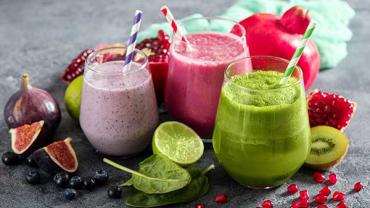
Smoothies seem to be a huge health craze as evidenced by the growth in smoothie franchises, chic smoothie cafes, and household devices that promise to make smoothie-making as smooth as possible. Even resolutions to eat healthier seem to be euphemisms for drinking more smoothies. With all the popularity and health claims that surround smoothies, it’s not at all surprising when individuals genuinely endeavoring to improve their health begin to question whether this new trend is as healthy as appears.
Before discussing smoothies, the terms must be defined. The term “smoothie” has been used to describe a wide array of items that are easy to drink, from protein drinks to blended fruit. For the sake of this blog, the term smoothie will refer to drinks with a blended base of fruit and/or veggies.
The question of whether smoothies are healthy is answered in another question, “What’s in it?” Smoothies can be a concentrated cup of healthy goodness or they can be a cup of disaster to one’s health. The outcome is contingent upon the ingredients.
Let’s first explore the potentially unhealthy components of a smoothie.
Sugar: The biggest potential health disaster in smoothies is the sugar content. The sugar load in a smoothie may not always be present in the form of added sugars. Instead, the source of sugar may be in the fruit – nature’s source of sugar as fructose. Smoothies (especially the commercially made variety) are notorious sources for an abundance of fruit. Fruit, alone, is certainly healthy, but hardly anyone would sit down and eat three to four pieces of fruit at one time. However, many smoothies are made primarily from fruit and it takes a larger quantity to fill a 16 to 20-ounce cup, increasing the amount of fructose the body metabolizes at one time.
Glycemic Index and Load: Perhaps the amount of sugar is not an issue, but what about its effects on blood glucose? One of the initial concerns with smoothies was whether ultra-processing fruits and vegetables which separated the components (namely, the fiber from the sugar) had an impact on the food’s glycemic index and load. A recent study measured the glycemic index (GI) and glycemic load (GL) of two commercial fruit smoothies to determine whether the impact of fiber was preserved. The results indicated that dietary fiber was retained and still positively influenced the glycemic response as indicated by a low GI and moderate GL. If fruit concentrates, fruit juices, or fractioned fruit are used in smoothies the fiber content will be eliminated, leaving a high GI and GL which will negatively impact blood glucose.
Macronutrient Balance: Drinking a cup full of fruit – even if a few veggies are added – does not provide a healthy balance of macronutrients. It provides a meal of carbohydrates, but virtually no fats and proteins to balance the metabolic effect of the carbohydrates. Further, studies showed that individuals who consumed smoothies that boasted of providing their daily need for fruits and vegetables were less likely to consume healthy, balanced meals and additional fruits and vegetables during the remainder of the day. Therefore, smoothies could become a “crutch” for consuming more unhealthy foods.
Nutrient Loss: Commercially prepared and stored smoothies may contain healthy ingredients, but processing procedures necessary for increasing shelf life are likely to damage some nutrients, lowering the antioxidant value. In one study of two fresh red vegetable smoothies based on tomato, carrots, pepper, and broccoli, there was a 2-fold loss in vitamin C following even a mild thermal treatment required to preserve the contents. Fresh smoothies impart the highest nutritional profile when consumed as soon as they are made.
Smoothies certainly can be a creative and convenient way to consume more fruits and vegetables. In turn, smoothies can help flood the body with additional antioxidants, micronutrients, and phytonutrients. However, some basic parameters should be followed to ensure smoothies are a concentrated cup of healthy goodness:
And finally, don’t let your smoothie replace healthful meals throughout the day. Smoothies can be a great way to incorporate more veggies, boost antioxidants, and can be a medium for delivering extra protein and phytonutrients. However, smoothies must be viewed as vehicles for health; otherwise, they easily become high-sugar, fruit-based, milkshakes that wreak havoc on your blood glucose and metabolism rather than supporting optimal health and well-being.